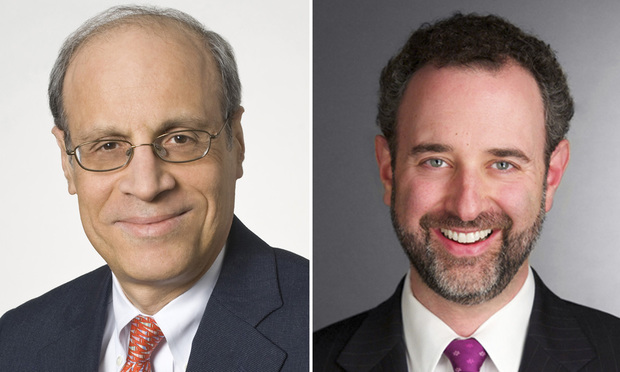Eric Alan Stone

May 12, 2015 | New York Law Journal
Fifty Percent Royalty Rate Affirmed Against Generic ManufacturerIn their Intellectual Property Litigation column, Lewis R. Clayton and Eric Alan Stone review the U.S. Supreme Court's recent decision on when a Trademark Trial and Appeal Board decision regarding likelihood of confusion can have issue-preclusive effect in an infringement lawsuit, along with appellate decisions regarding reasonable royalty rates and the "entire market value" rule in generic-pharmaceutical cases, application of the new test for patent indefiniteness, and more.
By Lewis R. Clayton and Eric Alan Stone
11 minute read

May 11, 2015 | New York Law Journal
Fifty Percent Royalty Rate Affirmed Against Generic ManufacturerIn their Intellectual Property Litigation column, Lewis R. Clayton and Eric Alan Stone review the U.S. Supreme Court's recent decision on when a Trademark Trial and Appeal Board decision regarding likelihood of confusion can have issue-preclusive effect in an infringement lawsuit, along with appellate decisions regarding reasonable royalty rates and the "entire market value" rule in generic-pharmaceutical cases, application of the new test for patent indefiniteness, and more.
By Lewis R. Clayton and Eric Alan Stone
11 minute read

March 09, 2015 | New York Law Journal
New Standard for Appellate Review of Claim ConstructionIn his Intellectual Property Litigation column, Lewis R. Clayton and Eric Alan Stone write: In the past two months, the Supreme Court handed down a significant patent-law decision establishing the standard of appellate review for claim-construction decisions, and resolved a circuit split by holding that a jury, not the court, should decide whether modifications to a trademark change the commercial impression of the mark.
By Lewis R. Clayton and Eric Alan Stone
12 minute read

March 08, 2015 | New York Law Journal
New Standard for Appellate Review of Claim ConstructionIn his Intellectual Property Litigation column, Lewis R. Clayton and Eric Alan Stone write: In the past two months, the Supreme Court handed down a significant patent-law decision establishing the standard of appellate review for claim-construction decisions, and resolved a circuit split by holding that a jury, not the court, should decide whether modifications to a trademark change the commercial impression of the mark.
By Lewis R. Clayton and Eric Alan Stone
12 minute read

January 15, 2015 | New York Law Journal
Lanham Act Decisions; Profits and Obviousness in Patent LawIn their Intellectual Property Litigation column, Lewis R. Clayton and Eric Alan Stone review recent Lanham Act decisions addressing the evolving post-eBay standards for granting an injunction, the distinction between advertising and protected statements of scientific opinion and the interplay between copyright and false endorsement law where an advertisement includes unauthorized music.
By Lewis R. Clayton and Eric Alan Stone
12 minute read

January 14, 2015 | New York Law Journal
Lanham Act Decisions; Profits and Obviousness in Patent LawIn their Intellectual Property Litigation column, Lewis R. Clayton and Eric Alan Stone review recent Lanham Act decisions addressing the evolving post-eBay standards for granting an injunction, the distinction between advertising and protected statements of scientific opinion and the interplay between copyright and false endorsement law where an advertisement includes unauthorized music.
By Lewis R. Clayton and Eric Alan Stone
12 minute read

November 12, 2014 | New York Law Journal
Business Methods, Fair Use, Patent Evidence, Lanham ActIn their Intellectual Property Litigation column, Lewis R. Clayton and Eric Alan Stone review recent cases involving the Supreme Court's test for patentable subject matter and how it has led to dismissal of infringement claims based on business method patents; when post-invention evidence can demonstrate an invention is not obvious; and whether the flavor of eggplant parmesan or its plating can acquire secondary meaning under trademark law.
By Lewis R. Clayton and Eric Alan Stone
12 minute read
Trending Stories
- 1Gibson Dunn Sued By Crypto Client After Lateral Hire Causes Conflict of Interest
- 2Trump's Solicitor General Expected to 'Flip' Prelogar's Positions at Supreme Court
- 3Pharmacy Lawyers See Promise in NY Regulator's Curbs on PBM Industry
- 4Outgoing USPTO Director Kathi Vidal: ‘We All Want the Country to Be in a Better Place’
- 5Supreme Court Will Review Constitutionality Of FCC's Universal Service Fund
More from ALM
- Legal Speak at General Counsel Conference East 2024: Match Group's Katie Dugan & Herrick's Carol Goodman 1 minute read
- Legal Speak at General Counsel Conference East 2024: Eric Wall, Executive VP, Syllo 1 minute read
- Legal Speak at General Counsel Conference East 2024: Virginia Griffith, Director of Business Development at OutsideGC 1 minute read



